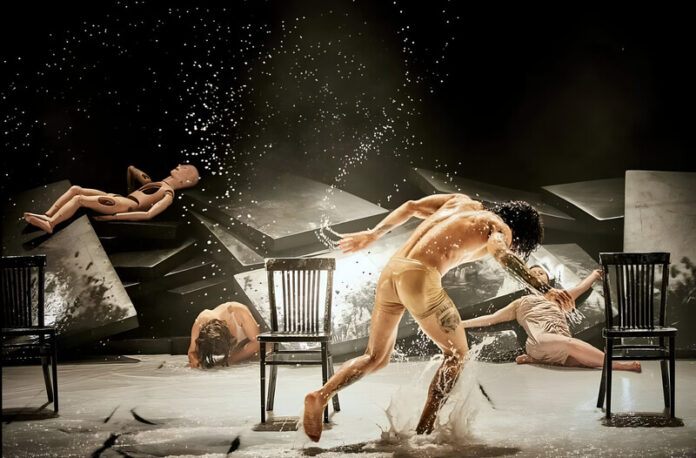
London – At Queen Elizabeth Hall, beneath the vast, echoing canopy of London’s Southbank Centre, I found myself ushered into the haunting, breathless stillness of MILK مِلْك – a work of visual theatre by Khashabi Theatre, an independent Palestinian ensemble led by the daring and uncompromising Bashar Murkus.
What unfolded over the next 80 minutes was less a performance and more a rupture – a rift in time and meaning that refused the familiar comforts of narrative or resolution. MILK does not ask why disaster strikes, nor does it seek to explain its aftermath. Instead, it drags the audience into the raw wound of the during – the suspended moment where chronology collapses, and all that remains is the ache of displacement, of mourning, of searching.
At the centre of this disorientation is a group of women, circling a patch of blackened ground. They are not characters so much as spectral presences, moving through the space with a blend of ritual and desperation. Their loss is collective and unspeakable: a motherhood severed, a future that loops endlessly into the past. There is no closure here. Only repetition.
Murkus, along with co-creator Khulood Basel and the Khashabi Ensemble, crafts a performance language that is stubbornly visual – images that burn into the retina, gestures that echo long after they end. Speech is sparse, perhaps unnecessary. The grief is bodily. It travels in the arch of a back, the tremor of a hand, the hesitant crossing of a threshold that no longer exists.
The political, though never stated, saturates the stage. This is Palestinian theatre not by declaration but by embodiment. The black earth, the rupture of time, the unreachable maternal line – all carry the weight of a people living in the unending ‘after’ of catastrophe. In that sense, MILK becomes a meditation on inherited trauma, on the impossibility of healing when the wound is still being inflicted.
What struck me most deeply was the performance’s refusal to sentimentalise. There is no soaring music to guide our emotions, no climactic catharsis to release them. Just the terrible silence of the unsayable, the unbearable loop of what cannot be undone.
Presented in collaboration with the Shubbak Festival, MILK is a devastating and necessary work. It does not comfort. It confronts. It leaves you hollowed, but wide awake.
It reminds you that for some, time stopped long ago – and that the theatre, at its most courageous, can hold that stillness without flinching.


